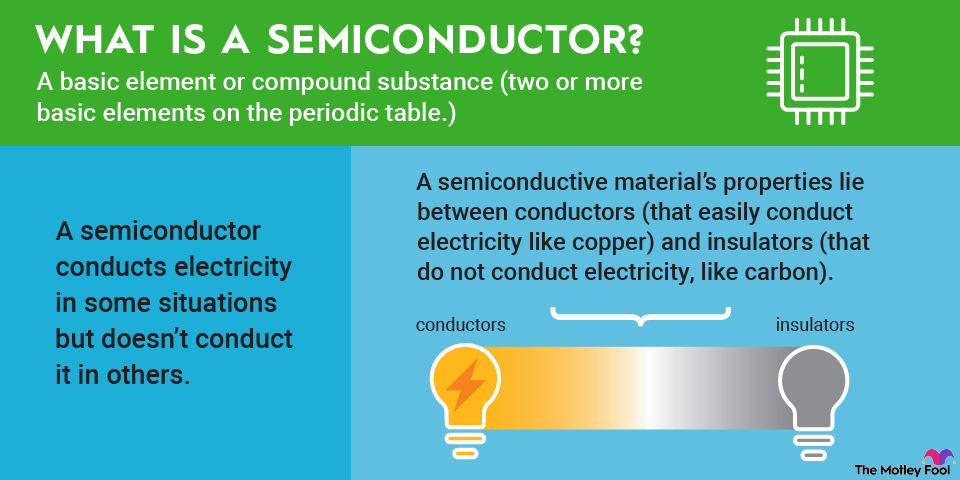It's often said that "chips are the new oil." In other words, chips -- the building blocks of all computing technology -- have become critical to the functioning of the economy. Without them, life as we know it would come to a screeching halt. However, to understand why chips are the new oil, you must first understand what a semiconductor is.

Understanding semiconductors
Semiconductors are really a story about electricity and the manipulation of its flow. The word "semiconductor" is often used interchangeably with the words "chip" and "microchip" -- small devices that comprise a computing or electrical system. Sometimes, the basic element silicon is also used in reference to semiconductors.
Scientifically speaking, though, a semiconductor is a basic element or compound substance (two or more basic elements on the periodic table). A semiconductor conducts electricity in some situations but doesn't conduct it in others. A semiconductive material's properties lie between conductors (metals that easily conduct electricity under normal circumstances, like copper) and insulators (substances that do not conduct electricity, like carbon).
Under normal conditions, silicon is actually a natural insulator. However, when subjected to special circumstances or with other elements added to it, silicon becomes a semiconductor. These special properties and silicon's natural abundance around the world are why silicon has become a basic material in the manufacture of semiconductors, or chips.
Why are semiconductors so important?
Electricity had long been discovered, but by the 1880s, it was ready for commercialization. Thomas Edison began selling electricity as a lighting source, presenting a potential replacement for oil and gas lighting used at the time.
However, electricity can be used for far more than a light source. Scientists in the 1800s also experimented with how electricity behaves, discovered how different materials and environments (like altering the temperature) could affect the flow of electricity, and learned how energy could be used to accomplish other things. By the late 1800s and early 1900s, the first "semiconductor devices" were being developed in experiments to transmit sound, emit light, and detect radio waves.
Later, semiconductors were shown to be effective in amplifying or switching electric signals (a device called a transistor) and, thus, able to manage the electric current. This work on transistors laid the groundwork for all modern electronics -- including the invention of the integrated circuit (aka microchip or chip) in 1958 by Texas Instruments electrical engineer Jack Kilby.
Semiconductors rule the world
Fast forward to today, and semiconductors (chips) are at the heart of nearly everything we do. Sure, the world still relies heavily on fossil fuels to create energy, but nearly everything that happens after energy is created is governed by semiconductors. But even in energy generation itself, semiconductors are beginning to take over.
Solar panels are mostly made of silicon. Chips are used in equipment that drills for and creates electricity from fossil fuels. Energy storage and transfer (the power grid) require semiconductors. Chips regulate the electricity flowing into and within our homes, workplaces, and vehicles. The internet stores and moves data via chips. And, of course, the computing devices we rely on throughout the day -- PCs, tablets, smartphones, wearables -- are built using semiconductors. Most of the products we use, if not all of them, were made with equipment featuring lots of chips.

Chips are the new oil, so what?
Semiconductors have proliferated throughout every nook and cranny of the global economy, but they aren't finished transforming our world. New economic secular growth trends are emerging, and novel semiconductor materials and more advanced microchips must be developed to support these efforts.
Silicon has been a fantastic substrate for chips for decades, but materials are being developed to manage the flow of electricity even more efficiently. Silicon carbide (SiC) and gallium nitride (GaN) are just two examples of newer materials gaining traction in the marketplace. This is key for electric vehicle (EV) development, as well as reworking the power grid to accommodate EVs and renewable energy projects like solar and wind.
With the advent of 5G wireless networks, fast internet is quickly becoming accessible from anywhere. But pervasive connectivity uses lots of electricity. New chips are needed to efficiently move data, manage wireless signals, and more efficiently operate devices (everything from phones to cars to factory equipment) wirelessly hooked up to a network.
New types of artificial intelligence (AI) -- think generative AI like ChatGPT -- are also in the early innings of boosting knowledge-worker productivity. Powerful new logic chips and computing accelerators are constantly being developed to make AI a practical tool for everyone. These chips are dramatically affecting how data centers are built. Data centers are the basic computing unit of the internet and cloud computing.
Related investing topics
Today's most advanced chips are also developing the next iteration of computing technology: quantum computing. A decade or more may still lie between now and quantum computing being commercialized. Nevertheless, researchers are working hard on how semiconductors and quantum mechanics could dramatically accelerate the development of things like new manufacturing materials, healthcare procedures, and drugs and even predict, plan for, and manage the global flow of money and assets.
Research and Development (R&D)
Long story short, semiconductors -- materials that can govern the flow of electricity -- have become essential commodities of everyday life. Plenty more research and development can make chips even more useful and, thus, the world more efficient. Investors of all kinds should know what semiconductors are and how they work!



















